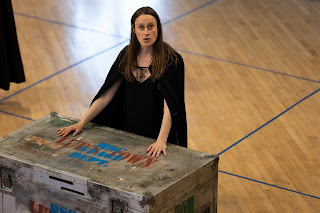The end product was never intended to be performed on a stage, and never was, but a recording of the final run-through rehearsal has now been released on the RSC website, available as a £10 stream.
For me it gives the rare opportunity to see some of the same cast play their roles throughout the second tet, notably Mariah Gale as Margaret and Mark Quartley in the title role. Perhaps even rarer, allowing me to slot it into the sequence wherever I liked means I can see the plays in the order they were written: Rebellion, Wars of the Roses, Richard III and now the prequel that came about after the initial trilogy's success. I think this order helps explain why this remains so little-regarded: It has its moments, and takes the story right up to the beginning of the earlier plays, but doesn't feel essential, and tends to be messy and confusing.
There are a few plot strands but the main two see Talbot (Jamie Ballard) take on Henry V's military mantle while the late king's son is too young to rule - he becomes England's biggest hope when the French start to reclaim the land Henry V conquered. Meanwhile Plantagenet, later to become the Duke of York (Michael Balogun) and Somerset (Mimî M Khayisa) formalise the power struggle that will eventually lead to the Wars of the Roses. In the meantime, their story eventually intersects with Talbot's, when their inability to cooperate leads to the downfall of the great general.
We also see the perspective of the French court, where a characteristically braggardly and cowardly Dauphin* (Jamie Wilkes) is propped up by the unlikely military genius of Joan of Arc (Lily Nichol.) Joan being both French and Catholic, and Shakespeare being his charactertistically subtle self, his version of the virginal saint is of course both a literal witch who conjures demons to her army, and shagging the Dauphin on the side. He also goes for the false narrative that she was burned to death by the English, supporting one of those very rare instances where the English lay claim to an atrocity they didn't actually commit.
With no design element to speak of, everything here is in the performances, which are strong, but with everyone mostly in just their rehearsal clothes, it's often hard to tell when the actors double up roles - since I wasn't in an actual theatre and this is a play I'm not very familiar with, I did dip into the text itself to figure out who was speaking if it wasn't particularly obvious (the website only credits each actor with one key role.) Doing this also illustrated quite how many cuts Doran and Horsley have made to the text, clearing out a lot of the waffle and helping speed the action along. While I don't think the play's reputation is unfair, I have to say the two edited versions of it I've seen so far have, if not stellar, been at least more coherent and less dull than either Henry VIII I've sat through.
The recording is placed very firmly in 2021 by the fact that people were still taking mask-wearing at least a little bit seriously, with the cast largely wearing theirs when they're not in a scene; Covid precautions do provide a little gag as well when, in another internal conflict, Gloucester (Christopher Middleton) and Winchester (Mark Hadfield) are made to shake hands, then both reach for the hand sanitiser as soon as the king's back is turned. But the point where the recording most comes into its own is right at the end, when Oliver Johnstone's Suffolk woos Margaret, supposedly on Henry's behalf, but very clearly with the intention of carrying on an affair with her himself. Gale and Johnstone have great chemistry in these scenes - the latter eventually turns to the camera and pushes it away so we can't see quite how great.
All in all this recording is a bit of a curiosity. I didn't watch any of the streamed rehearsals so it doesn't really offer an insight into their techniques† but it does, in the absence of most design elements, show how much work those elements do in a fully-staged production and how crucial they are; while at the same time showcasing the actors' work stripped to its essence. I'm not someone who assumes Shakespeare had some grand plan to his career, so I don't think his writing this after the other three Wars of the Roses plays was necessarily an intended bridge between them and the first tet he was eventually planning to write. But it's true Henry V takes us right up to the point where this starts, and Rebellion aka The First Part of the Contention Betwitxt the two Famous Houses of York and Lancaster picks up right where it leaves off, so in these plays written out of chronological order he gives us a continuous eight-part cycle if anyone wants to stage them that way. But hardly anyone ever does, so he needn't have bothered.
Henry VI Part 1 by William Shakespeare is available to stream until the 30th of September from the RSC's website. You can also stream the fully-staged productions of Rebellion and Wars of the Roses, which I reviewed earlier this year.
Running time: 2 hours.
Photo credit: Ellie Kurttz.
*Shakespeare tends to give different characters who share the same title in history plays similar personalities: Warwicks are influential, Exeters wise and Gloucesters a bit dodgy. Dauphins are effete idiots, but actual Kings of France tend to be wise and noble adversaries, despite the fact that they will have previously been Dauphins
†although ordering this stream also gets you access to a 13-minute behind-the-scenes clip I haven't watched yet, so that may well answer more of those sorts of questions







No comments:
Post a Comment